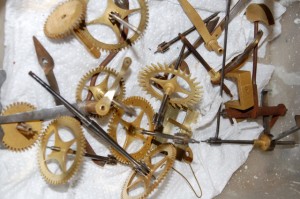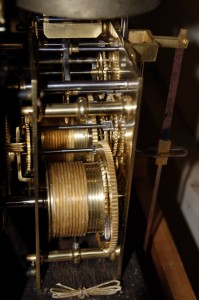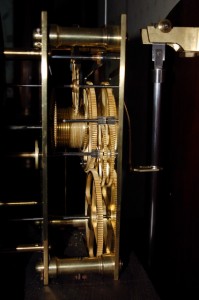I have mentioned about the Clockmakers Company before, but I believe this institution needs mentioning in further detail.
Royal Charter 1631
The Clockmaker’s Company was founded under a Royal Charter of King Charles I in 1631 This makes this organization coming up to 400 years old and one of the oldest guilds in the world. It is the main reason why London and the UK became the centre of clock making in the 17/18 and 19th centuries. The guild kept standards very high. Its powers were restricted on the whole to the city of London but its influence stretched further afield. This vital group was important in quality control, training and the welfare of its members.
Conditions of being a Member
To sell and manufacture antique clocks within the city of London one first had to become a freeman of the Clockmaker’s Company. This was achieved by becoming an apprentice to a free cloc kmaker. This was done through purchase or by the right of a child to follow a parent into the profession. Quality was kept extremely high, as if standards slipped the Company had to right to confiscate or destroy your work.
It was also important for the Clockmaker’s Company to manage the various arts of clock making into one cohesive unit. Everyone was working together for the benefit of each other. i.e. the bell makers, engravers etc
Visit London
It is important if you visit London to go to the Clockmaker’s Companythis was situated in the Guildhall, but it is now based at London’s Science Museum. They have in my opinion one of the finest collections of clocks and related information in the world. John Harrison’s 5th marine chronometer completed in 1770 is on view here.
Below is a list of the masters of this Clockmaker’s Company from 1631 up until 1875. This guild is still going strong today. The Company was and still is governed by a “Court” of ten or more “Assistants”. Each year a Master is elected and three wardens and a clerk who attends to its day to day business. You will notice some very famous antique clock makers below.
The Worshipful Company of Clockmakers (1631-1875)
1631-1649
The Masters
1631 David Ramsey
Named in the Charter
1632 David Ramsey
Sworn 22nd October
1633 David Ramsey
Represented by his Deputy
Henry Archer
1634 Sampson Shelton
1635 John Willow
1636 Elias Allen
1638 John Smith
1639 Sampson Shelton
1640 John Charleton
1641 John Harris
1642 Richard Masterson
1643 John Harris
1644 John Harris
1645 Edward East
1646 Simon Hackett
1647 Simon Hackett
1648 Robert Grinkin
1649 Robert Grinkin
1650-1699
1650 Simon Bartram
1651 Simon Bartram
1652 Edward East
1653 John Nicasius
1654 Robert Grinkin
1655 John Nicasius
1656 Thomas Holland
1657 Benjamin Hill
1658 Benjamin Hill
1659 Simon Hackett
1660 John Pennock
1661 John Coxeter
1662 John Coxeter
1663 John Pennock
1664 Henry Child
1665 Jeremy Gregory
1666 Jeremy Gregory
1667 Jeremy Gregory
1668 Thomas Taylor
1669 Thomas Taylor
1670 Thomas Claxton
1671 Nicholas Coxter
1672 Samuel Home
1673 Samuel Home
1674 Jeffery Bailey
1675 Jeffery Bailey
1676 Jeremy Gregory
1677 Nicholas Coxeter
1678 Ralph Almond
1679 Samuel Vernon
1680 Walter Hayes
1681 John Brown
1682 Richard Ames (died)
Benjamin Bell
1683 Richard Lyons
1684 Thomas Wheeler
1685 Richard Jarratt
1686 Edward Norris
1687 Thomas Taylor
1689 Nathaniel Barrow
1690 Henry Wynne
1691 Henry Jones
1692 Nicasius Russell
1693 William Knotsford
1694 William Clements
1695 Wither Cheney (excused)
Walter Henshaw
1696 John Sellar (excused)
Edward Stanton
1697 John Ebsworth
1698 Robert Williamson
1699 Robert Halstead
1700-1749
1700 Charles Gretton
1701 William Speakman
1702 Joseph Windmills
1703 Thomas Tompion
1704 Robert Webster
1705 Benjamin Graves
1706 John Finch
1707 John Pepys
1708 Daniel Quare
1709 George Etherington
1710 Thomas Taylor
1711 Thomas Gibbs
1712 John Shaw
1713 Sir George Mettins (Lord
Mayor 1724-1725)
1714 John Barrow
1715 Thomas Feilder
1716 William Jaques
1717 Nathaniel Chamberlain
1718 Thomas Windmills
1719 Edward Crouch
1720 James Markwick
1721 Martin Jackson
1722 George Graham
1723 John Berry
1724 Joseph Williamson (died)
1725 Peter Wise
1726 Langley Bradley
1727 Cornelius Herbert
1728 James Drury
1729 Richard Vick
1730 Thomas Stones
1731 John Marsden
1732 William Bertram (died)
1733 William Tomlinson
1734 Edward Faulkner
1735 Hugh Richards
1736 James Snelling
1737 Thomas Wrightson
1738 John Maberly
1739 John Pepys
1740 William Sherwood
1741 John Stafford
1742 Thomas Hughes
1743 David Hubert
1744 John Hiorne
1745 Joshua Appleby
1746 Mathew Skinner
1747 Nathaniel Delander
1748 Samuel Whichcote
1749 William Scafe
1750-1799
1750 Henry Horne
(Change to new style calendar)
1751 Nathaniel Style
1752 Joseph Stephens
1753 Henton Browne
1754 Jasper Taylor
1755 William Webster
1756 Francis Perigal
1757 Charles Cabrier
1758 Conyers Dunlop
1759 Devereux Bowley
1760 Stephen Goujon
1761 Benjamin Sidey
1762 John Jones
1763 Anthony Benn (died)
1764 Samuel Whichcote
1764 William Addis
1765 Thomas Hughes
1766 Daniel Fenn
1767 Peter Higgs
1768 Samuel Charrington (died)
Charles Merry
1769 Thomas Garle
1770 James Brown
1771 Daniel Aveline (died)
1772 Eliezer Chater
1773 David Rivers
1774 William Rogerson
1775 Francis Perigal
1776 Joseph Stephens
1778 Southern Payne
1779 William Plimley
1780 Francis Atkins
1781 Robert Poole
1782 Thomas Lea
1783 Nathaniel Sargeant
1784 James Green
1785 Hilton Wray
1786 Edward Tutet
1787 Charles Howse
1788 James Richardson
1789 Benjamin Sidey
1790 Richard Style
1791 Daniel Fenn
1792 The Rev. Dr. Robert
Hamilton
1793 Samuel Fenn
1794 William Rivers
1795 Harry Potter
1796 John Jackson
1797 John Ward
1798 Richard Duncombe
1799 John Marriott
1800-1849
1800 Matthew Dutton
1801 William Plumley
1802 Edward Gibson
1803 Timothy Chisman
1804 William Pearce
1805 William Robins
1806 Francis S Perigal Jnr
1807 Samuel Taylor
1808 Thomas Dolley
1809 William Robson
1810 Paul Philip Barraud
1811 Paul Philip Barraud
1812 Harry Potter (died)
1813 Isaac Rogers
1814 William Robins
1815 John Thwaites
1816 William Robson
(First Master to be sworn in
January of the following year)
1817 John Roger Arnold
1818 William Robson
1819 John Thwaites
1820 John Thwaites
1821 Benjamin Lewis Vulliamy
1822 John Jackson Jnr
1823 Benjamin Lewis Vulliamy
1824 Isaac Rogers
1825 Benjamin Lewis Vulliamy
1826 John Jackson
1827 Benjamin Lewis Vulliamy
1828 Richard Ganthany
1829 Richard Ganthany
1830 William Harris
1831 William Harris
1832 William Harris
1833 John Sharp
1834 Edward Ellicott
1835 Edward Ellicott (died)
John Sharp
1836 William James Frodsham
1837 William James Frodsham
1838 John Grant
1839 John Grant
1840 William Gravell
1841 William Gravell
1842 Joseph Fenn
1843 Joseph Fenn
1844 Richard Pinfold Ganthaed (died)
1845 George Atkins
1846 John Grant
1847 Benjamin Lewis Vulliamy
1848 Francis Bryant Adams
1849 Francis Bryant Adams
1850-1875
1850 John Aldington Perry
1851 John Aldington Perry
1852 George Harker
1853 George Harker
1854 James Adams
1855 Charles Frodsham
1856 John Carter, Alderman
1857 James Adams
1858 John Grant
1859 John Carter (Lord Mayor
1859/1860)
1860 William Rowlands
1861 George William Adams
1862 Charles Frodsham
1863 Joseph Fenn
1864 John Carter, Alderman
1865 Francis Bryant Adams
1866 John Garratt Curtis Addison
1867 William Rowlands (died)
1868 John Grant
1868 George William Adams
1869 William Lawley
1870 George Moore
1871 John Garratt Curtis Addison
1872 William Wing
1873 Charles Wellborne
1874 William Lawley
1875 George Moore


